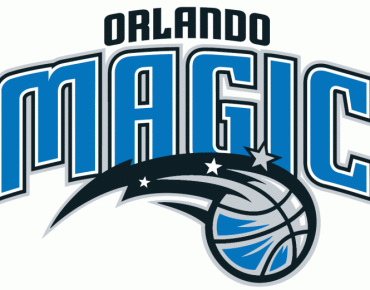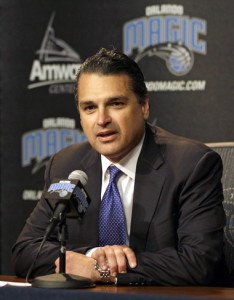Data Analytics Drives New Fan-Team Relationship for NBA’s Orlando Magic

Short of shooting three-pointers and grabbing rebounds, advanced data analytics has taken on a pivotal role for the Orlando Magic of the National Basketball Association, driving nearly every aspect of the organization’s relationship with its fans in one of the most sophisticated data-driven marketing and operations strategies in professional sports.
The Magic partnered last year with Venuenext, a small San Jose tech firm with a clientele that includes the New York Yankees, San Francisco 49ers and the Dallas Cowboys. Venuenext has integrated the Magic’s data platform with myriad third-party ticketing, food & beverage and retail systems, and driven apps out to the edge in the form of season ticket holders’ smart phones – a “remote control” for the fan experience. Together, Venuenext and the Magic are intent on using predictive analytics to transform not only the experience of attending games at the Amway Center in Orlando but also the very nature of the fan-team relationship.
In short, long gone are the days when a sports franchise could add Gulden’s to the yellow mustard in the hot dog condiment rack and jug wine to the concession stand menu, and call it a premium fan experience. Now teams are using data analytics for personalized interactivity with their fans that delivers entertainment, benefits and a sense of membership – along with more revenue.
“We’ve created an app that really coalesces all of the platforms that we utilize from a fan experience standpoint into one location, into one app for our fans on their smart phones,” said, Alex Martins, who joined the Magic’s as PR manager in 1989 and became CEO in 2006. Speaking recently at the Structure Data conference in San Francisco, Martins said Venuenext handled the platform integration work.
“None of this was possible before our partnership with Venuenext,” said Martins, adding that the sports industry has been “late to the game” in the use of data analytics. “They created the platform that we’ve been able to integrate everything from POS systems, to ticketing systems to parking, and it’s allowing us to collect more data and utilize it to grow our business in a way that we’ve never been able to do before.”
According to Venuenext CEO John Paul, who spoke with Martins at the Structure Data conference, an important factor to the effectiveness of the partnership was the Magic’s willingness to give Venuenext full access to its existing data analytics system and allow it to be integrated with the Venuenext platform. “I’ve never heard that before or since,” Paul said. This was the basis for Venuenext then integrating the Magic’s data and analytics models with a number of third-party retail and ecommerce systems, from Google Wallet and Apple Pay to Ticketmaster to the Chick-fil-A promotional couponing app.
Paul said Venuenuext opens its APIs to its clients to encourage broader systems integration. “Mostly, we’re integrating other peoples’ platforms into ours, but we’ve said to everyone that, yes, we’d like more innovation, we can’t do it all,” said Paul. “So we will open up our APIs to our partners, let them utilize what we’ve got in our platform, and everything we add to our platform makes it more productive.”
The result is that much of the fan experience is now done in the form of active, personalized engagement with the Magic, activity that generates data fed into an increasingly intelligent, predictive platform. “They can do everything from parking, to transfer tickets, to upgrade their tickets, and order food and beverages from their seat and have it delivered to their seat.”
Martins said one aspect of the mobile app is a monetary and merchandizing system allowing season ticket holders to sell individual game tickets back to the team and receive in return “Magic Money,” account credits they can use to purchase additional tickets to future games, for food and beverages or for retail items sold in the Amway Center. “We’ve changed what used to be a season ticket purchase into what is now a membership, utilizing all this data,” he said.
Indeed, much of the Magic’s focus – as with any sports team – is maintaining a high season ticket renewal rate, and much of that involves enhancing the value of fans’ investment in the team.
“Think about it from a fan point of view,” said John Paul, CEO of Venuenext. “For the old season ticket holder, here are two sets of tickets, he’s had them for 20 years, his dad passed them down to him. There are 41 games, he can’t go to all of them, so he generally feels he’s overpaid for those seats. But what the Magic have done is said, ‘If you’re not going to use those seats turn them back in.’ They get to sell the seat again on the secondary market, or they get to use them for one of those upgrades, and I (the fan) get that value, I can come back to the next game with five people in five seats together. So I feel like I’m a member of the Orlando Magic Club, and I’m getting all the value I’ve paid for my season tickets.”
One fan, Paul said, uses his Magic Money to pay for valet parking at the Amway Center.
The Magic have also taken on the single biggest fan complaint: missing portions of the game while waiting in long concession lines. Season ticket holders using the app get access to fast lane passes.
A key to the success of the mobile app has been its high adoption rate. According to Paul, most fan apps get around 5 percent usage, but approximately 80 percent of the Magic’s season ticket holders have the team’s app, and roughly 30 percent of the fans in attendance at games use it. App downloads are up 300 percent over a year ago, according to Martins.
“This has been a challenge for our industry,” Martins said, “finding a manner in which we can raise the number of downloads for our apps for teams. We’ve been trying to crack that code for several years. This finally has been the one opportunity for us to increase those downloads exponentially and increase the use of our apps overall.”
With a high app usage comes more data, providing the organization better predictive insight into fan behavior. One of the first things the Magic did with their enriched data was to bring rigor to what had been an annual exercise in intuitive guesswork: setting ticket prices for the following season.
“When we were going through things like yield management, and ultimately determining ticket pricing, the annual exercise was like, ‘Ok, based on how the team was this year we’ll go with a 4 percent increase,” Martins said. “Or, ‘We weren’t very good this year so we’ll remain flat.’ There was no data that went into the whole ticketing process.” Once ticket prices were set, prices remained static.
Now, Martins said, ticket price strategy is based on data. The process begins with season ticket pricing, which is decided upon with a predictive analytics model that assesses the likelihood of renewals based on actions of season ticket holders during the previous year. Factors include: how often they utilized their tickets, how many times they transferred or sold their tickets, how much food and beverage they purchased, and so forth. All these behaviors indicate the level of fan commitment and their tolerance, if any, for a price increase the following year.
“It allowed us to build a predictive model and create a road map for our service reps to determine which of our clients we needed to spend the most time with to, hopefully, transition them into renewing for the following season,” said Martins.
Individual game tickets are based on season ticket pricing, but are then handled in a fast changing, game-by-game manner based on real-time data from the secondary market. “We transitioned to a dynamic ticket pricing system, whereby our ticket prices change by the minute, based on the demand and real-time data that feeds our entire ticketing system.”
Pricing factors include which night of the week the game is taking place (“Monday night games are death” - Martins), the quality of the opponent and whether the team is on a hot or cold streak. The variables are fed into the Magic’s seven-tier ticket pricing system.
Adoption of these techniques has come at a particularly useful time for the Magic because the team – in possession of a lowly 29-40 record, good for 12th place in the Eastern Division as of this writing – has been in rebuilding mode for three years.
“Traditionally what would happen in those periods of time is you’d just accept that your team was not that good, you would set your pricing at a flat level compared with the year before and you’d deal with fact that your volume would be down,” Martins said. But now the team can better track high-demand games and set ticket prices accordingly, or drive volume on what would otherwise be a low-revenue game by lowering prices.
“What it’s done is help us raise our top line revenue in a period of time where we just haven’t been very good on the court,” Martins said.
Another strategic benefit of the system is precise measurement of sponsor promotions.
“We’re working on a system where instead of handing fans a coupon as they’re leaving the building that they can redeem tomorrow,” said Martins, “we’ll be able to integrate that into our app, they’ll be able to take the Magic app to the sponsors restaurant the following day and through POS interaction redeem that food order right off the application. All the data we can exchange and interchange with our clients. It gives us the ability to say, ‘You know what, you’re promotion truly worked this year,’ as opposed to guessing at how many people showed up to redeem those sandwiches.”
Martins said the Magic’s use of data analytics is only just beginning. Future ambitions include couponing promotions that tell fans in advance which sponsors will hold give-aways of which specific products and a gamification strategy designed to increase fan engagement during games that includes specialized replays and statistics.
“From our standpoint it’s another opportunity to take this app to a whole other level and really engage the fans with the play on the court itself,” Martins said.











